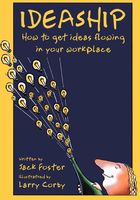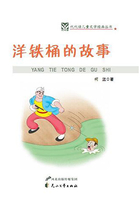From $100 Startup to Global Company
I began my UPS career as a package delivery driver in northern Idaho and served in that position for six years before being promoted to supervisor. Each time I assumed a higher level of responsibility, my view of leadership changed. What never changed, however, was the imperative to deliver. That was always at the center of everything we did at UPS.
Before we examine the unique culture at UPS, let me tell you a little bit about the company itself. I don't believe it's possible to truly understand how a culture like this exists and thrives unless you know something about its origins. UPS began as the American Messenger Company on August 28, 1907 by two teenage boys named Jim Casey and Claude Ryan. They started with one bicycle and $100.00 they borrowed from a friend. Their six-by-seven-foot office was rented for $15.00 per month and was located in the basement of a saloon in Seattle, Washington. In 1919 the firm adopted its present name, United Parcel Service (UPS).
The group's initial vision was to build a small messenger service with just a few people delivering messages on foot, by streetcar, and by bicycle. Times were tough-so bad, in fact, that legend has it there were intense discussions about how to justify the purchase of a one-cent stamp.
Fast-forward to the present, and the stark difference in the business scale and sheer size of our far-flung operations is almost beyond comprehension. Today, UPS is a worldwide company serving more than 220 countries and territories with approximately 435,000 employees. It has more than 100,000 vehicles, 540 airplanes, and nearly 28,000 facilities. UPS delivers on average more than 18 million packages and envelopes a day, which translates into a rate of about 37,500 per minute or 625 per second. In addition to the package side of the operations, UPS has a growing supply-chain management solutions business that features services like logistics and distribution, transportation and freight (i.e., air, sea, ground, and rail), forwarding to and from 195 countries, international trade management, and customs brokerage. In the United States, UPS is the leading provider of less-than-truckload services coast-to-coast, using 5,800 vehicles and 20,000 trailers.
The UPS package car (never called a truck at UPS) and those heroes in brown uniforms (and socks) who deliver the packages each day are the first images that come to mind for most people when they think about our company. Although the uniforms worn by UPS drivers are similar around the world, the vehicles are not. For example, we use airboats in Vietnam, in some remote areas of Alaska packages reach their destination by dogsled. As you might imagine, gondolas are loaded with UPS packages in Venice; in Taiwan and Bangkok, tuk-tuks filled with UPS packages are a common sight throughout the crowded city streets.
A "Culture of We"
The UPS culture that we know today comes from a well-established, values-based environment formed in the company's early years. It was built on discipline, accountability, and the utmost respect for others at the outset. In 1929, our founder, Jim Casey, added to the company's policy book that UPS people would always be addressed by their first name. Jim was never too busy to talk to fellow employees at any level of the organization, and that practice quickly filtered down to the department managers and into their daily routines.
Greeting people, looking them in the eye, and listening to their concerns were things Jim loved to do, and he went out of his way to do them regularly. In Jim's view, the porter or car washer was just as important as the company's top-level executives. He had a genuine interest in people; whenever he met someone, he wanted to hear their stories and ideas for making the company better. He would never rush a conversation and would give the person his full and undivided attention. He openly described how he loved to learn from others and often incorporated their ideas into the business. Servant leadership is a popular term today. Serving others came naturally to Jim more than a hundred years ago, and he made it the cornerstone of our culture. He was all about "we" when it came to his UPS family.
My first encounter with Jim was in our UPS building in Seattle. It was late in the day, and I was the only person around. I was focused on hooking up a charger to a dead battery in one of our package cars when I suddenly felt someone standing next to me. I turned, and there he was, Jim Casey himself. I couldn't believe my eyes, and I'm sure he saw the look of shock on my face.
He stuck out his hand and said, "Hello, my name's Jim. What's yours?" Fortunately, I could remember it.
Then he said, "Here, let me help you. I'll hold the cables if you want to try to start it."
For a few seconds, I thought I was dreaming. Here was Jim Casey, our founder, a legend, and a man I idolized, getting his hands dirty while working alongside me at the very end of the day.
After the car started, Jim asked if I could take a few minutes to talk with him. He motioned toward a bench, where we sat and talked for about thirty minutes. During this conversation, he asked me what I thought about "our" company and what ideas I might have to help us better serve our customers and become more efficient in our operations. Jim treated me as if I was his mentor, instead of the other way around. It was a day that I'll never forget and an experience that shaped my approach to leadership for the rest of my career.
HOW LEADERSHIP LOOKS FROM HERE
Leaders Walk the Talk
Funny, isn't it, how the most memorable moment of my professional life came down to a thirty-minute conversation on a bench in a maintenance shop. The vivid memory of the main man and little ol' me, just sitting around talking like members of one big, happy family, is forever burned in my brain. And, as it turned out, we were family.
Those who knew Jim best often observed that he was a walking contradiction. He was a dreamer, but he was also a doer. He was magnetic, but he avoided attention. He was confident, yet humble. He respected tradition, but change excited him. He was urgent and sometimes intense, but he always seemed calm and at peace. He was a visionary who could see the big picture but also a perfectionist who could zoom in on a misplaced comma.
The contradictions were vintage Jim Casey. However, he was, first and foremost, an avid learner and a devoted teacher. He wanted to better understand and be able to explain things for the sake of improvement.
Former UPS CEO George Smith said Jim taught him that the essence of leadership is just four basic things: to teach, to coach, to be taught, and to learn. Honestly, can it get any simpler than that?
Founding Principles That Have Endured
As unbelievable as it may seem, Jim Casey and his partners created policies, principles, and values in the early 1900s that continue to guide the company well over a hundred years later. As a constant reminder of this living heritage, the UPS policy book is referenced often today. In fact, it's still read at the start of staff meetings in UPS offices around the world. Our culture and founding principles are also frequently discussed in daily pre-work communication meetings with employees.
To be truly effective, a company's culture has to dwell in the hearts and minds of the people charged with delivering its mission. They have to live and breathe their culture every day. It can't be reduced to some slogans plastered on a wall or a mission statement mounted in a nice picture frame. Rather, it must embody the soul of teamwork. It is up to the leaders to not only talk with their team members about those principles but also to live by them. To sustain a unique culture, all the components need to be present in the right proportions.
Creating an environment like this requires consistency and discipline. To succeed today and long into the future, you need to establish a culture based upon sound principles and policies that align with the values of your organization. At UPS, that strategic alignment is demonstrated in the following bedrock principles.
Establish a culture based upon sound principles and policies that align with the values of your organization.
People: Treat Everyone Equally
At UPS, we take a sincere interest in the well-being of our team members and treat everyone equally. In the words of Jim Casey:
The policy of impartiality means that everybody is treated equally; everybody has an equal opportunity; one person is on a par with all others; one can advance only because of more capability than others.[2]
A major factor in providing everyone with an equal opportunity to grow and rise in the ranks is the practice of not hiring relatives or friends, avoiding the potential for favoritism. In addition, our culture is built upon the belief that our people come first. For example, there is an open-door policy that gives all workers access to their managers.
UPS does not believe in titles per se and, as I mentioned, encourages everyone to be on a first-name basis. That is the expectation for our managers, although there are some other exceptions due to cultural considerations in countries outside the United States. We try to be as informal as possible whenever it's appropriate. Accordingly, as I alluded to earlier, it is not unusual for a car washer to call the CEO by their first name and vice versa. It's the family culture upbringing. Although UPSers have different responsibilities, we are still all in it together, working toward the same goals.
Once the people you deal with recognize what you do springs from an honest heart, they will be surprisingly strong in their support of you.
·They will believe what you say.
·They will do what you want.
·They will give you their loyalty.
·They will trust and follow you.[3]
Pride: Show Pride in the Company and Pride in the Work
Someone once asked me to pick one word that best describes why UPS is so special. The answer was easy. I had lived it every day as an employee, and I still live it today. That word is pride. We show pride in the company and pride in the work that we do.
Of course, pride can be instilled in many different ways. At UPS, it comes from professionalism, quality service, and the quest for perfection in everything we do. For instance, our appearance standards help us present an image that UPSers are proud of and yield something tangible and continuous that the public depends on. It's hard to quantify exactly why something so simple is so inspiring in its own understated way, but the results confirm that professional appearance matters.
We show pride in the company and pride in the work that we do.
Our customers often say that they know they can trust UPS because of our reputation. A big part of that comes from the pride within our ranks and the way we consistently perform so well in all the small things.
Appearance: Make a Positive Visual Impression
Quality is largely a matter of appearance. People judge us by the visual and mental impression they get. If those impressions are to be favorable, we must have the appearance of doing a good job.[4]
From the beginning, UPS decided it would be a company that would send customers a strong message of assurance and quality by making a positive visual impression on the public. This belief, and the resulting emphasis on making positive impressions, extends not only to uniforms for drivers but also to sparkling-clean package cars, offices, and buildings. Just as they did more than one hundred years ago, today's drivers must meet these strict appearance standards, including good personal hygiene, cleaned and pressed uniforms, and shined shoes.
When a store executive sees one of our cars with dented fenders, or a scratched body, or a car in need of paint, what kind of impression does that create? And whose fault is it? The driver's? No. It's the fault of someone higher up for failing to have an inspection system that will detect such defects immediately and have them corrected before the car goes out on the road.[5]
Simply said, it is the leaders' job to "see it-own it-solve it-do it" when they encounter a problem or an opportunity to improve something.
Communication: Build a "Culture of We"
UPS employees gather for a daily meeting (known as a pre-work communication meeting, or PCM) with their supervisor prior to starting work, where they hear current company news and other topics of interest that may relate to their particular group.
During the PCM in the operating centers, managers have an opportunity to inspect their drivers to ensure they meet the company's appearance standards. Although these meetings usually last about three minutes, they keep employees informed about significant company news.
Keep employees informed about significant company news.
Open communication helps to avoid unpleasant surprises and workplace rumors. Keeping employees informed and engaged in these quick pre-work meetings is an excellent way to start the day.
Owned by the Managers, Managed by the Owners
UPS's managers (and many of the company's employees) own UPS stock. This ownership structure has produced a tremendously positive effect on the day-to-day operations as well as on the company's long-term goals of growth and financial stability.
Promotion from Within
UPS believes that managers who start with the organization and rise through its ranks are likely to be more committed, aligned, and knowledgeable than those brought in laterally from the outside. We promote from within to ensure that the company can pass on our legacy and culture seamlessly from one generation to the next.
When we invest in people, we're looking at it as a lifetime decision. This is why the hiring process is so important and should never be rushed. We look for people who want a career with us, not just a job for a limited time. This is a huge part of the success formula at UPS.
The part-time loader in a hub could well be the future CEO, and UPS's strategy is to hold on to people who show potential throughout their careers. Most new hires start as part-time employees and work their way up through the ranks.
Following our tradition, the management team at UPS, including the CEO and management committee, started as drivers, part-time loaders, car washers, and clerks. As part of the promotion process, all must spend time as package car drivers or as driver helpers to understand the heart of our business. With an active succession plan, we always know where we'll draw the next level of leadership from within the company.
Constructive Dissatisfaction
No matter how successful a company is, its employees should never be satisfied. Once we do something well, we should start over and figure out how to do it better. Good companies adapt to changing conditions; great ones stay ahead of them. They don't deny that perplexing conditions exist, nor do they pretend that markets will never be uncertain or unkind. In fact, they embrace those realities and the potential for a storm by staying nimble and agile. They are "constructively dissatisfied." Leaders make conditions; they don't become victims of them.
It is always the little things in business that matter most, and one of those "little" things that Jim Casey noticed and remarked on remains true for most organizations today. It went like this:
I think we should test and check many of our present practices. Some of the things can be eliminated, and some can be improved. Among other things, I think we are using many useless reports. I think we are filling out forms that don't need to be filled out. I think we are doing a lot of work that accomplishes nothing, and we ought to study that and dispense with it as quickly as we can.[6]
Managers should not be reporters of problems; they need to be fixers of problems and take corrective action on the spot. If they need help, they should sound the alarm. No one should turn his or her back on anything that is not up to strict company standards.
Although UPS isn't perfect, it may be worth noting that 88 percent of the companies on the Fortune 500 list in 1955 are now dead and buried. So how can a company that traces its roots back to 1907 still be going strong today? How has UPS managed to place at the top of almost every list for best places to work, strong management, and quality of investment, year after year?
The answer is a combination of factors, but recognizing our shortcomings and being "constructively dissatisfied" would have to be towards the top of that list.
How You Can Deliver
·Develop an atmosphere of mutual respect and trust. When appropriate, call people by their first names.
·Do more than talk company culture; live it and make it come alive within your team.
·Make sure that your employees hear company news and anything that directly affects them from you first.
·Remember that high standards of appearance represent you and your company. Be strict; do not compromise.
·When possible, provide a platform that allows everyone to be owners, not just employees.















